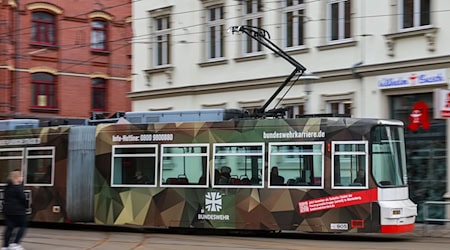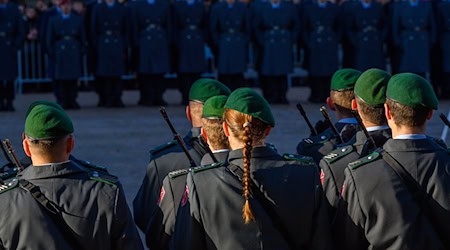Barbara Oehlke (CDU) hosted a discussion on November 14, 2024 on a highly topical subject: the reintroduction of compulsory military service and the introduction of a compulsory year of service. The event was well attended and the guest speaker was Dr. Thomas Arnold, CDU Saxony and member of the Basic Values Commission, who opened the discussion with a keynote speech.
Arnold began by emphasizing that the discussion is taking place in a different context. Since the Russian war of aggression in Ukraine, the security situation in Europe has changed fundamentally. At the same time, there is also an urgent need for helping hands in the non-military sector, be it in civil protection or care. "It's good that young people have the experience of seeing and learning about everything that exists in our society," explained Arnold, describing his own experiences from his youth, when he worked in a monastery and took on care duties.
The historical dimension of compulsory military service
Conscription in Germany was suspended under Defense Minister Karl-Theodor zu Guttenberg, but not abolished. The decision to suspend compulsory military service had far-reaching consequences: properties were sold and structures dismantled. Today, according to Dr. Arnold, we are faced with the challenge of painstakingly rebuilding this infrastructure. A return to compulsory military service could require time and considerable financial resources.
Social year: opportunity for cohesion or economic drag?
While Dr. Arnold was open to the idea of a compulsory social year, business associations argued against such a project. An additional year's delay for young people who only enter the job market after school, university and possibly an Erasmus stay could be a burden on the economy. Nevertheless, many advocates see mandatory service as a way of strengthening social cohesion and getting young people out of their "echo chambers" and practising one or two virtues.
Carsten Linnemann, CDU Secretary General, is pushing the issue energetically. At the CDU's last party conference, it was decided to include a compulsory social year in the program. Lars Rohwer (CDU, MP) explained: "We see this as a service that enables all young people to make a temporary and concrete commitment to our country and our society." The idea is to bring people from different walks of life together and thus promote cohesion.
Conscription or year of service: a three-pillar model
Dr. Arnold proposed a model based on three pillars:
- Conscription: The reintroduction of conscription is intended to strengthen the Bundeswehr in terms of personnel. Germany currently has around 113,000 soldiers; by 2031, it should have 203,000 as part of NATO requirements. Compared to the troop strength of the 1980s (around 500,000 men in the former FRG), this seems modest in view of the current threat situation.
- Social commitment and care: A compulsory year of service could provide much-needed support in the social sector. The care situation is precarious in many places and a compulsory year could provide relief.
- Disaster management: The so-called "white aid organizations" such as the German Red Cross (DRK) rely heavily on volunteers. Compulsory service could provide valuable support here.
Controversies and unanswered questions
The debate showed that there are many unanswered questions: How long should the compulsory year last? Can it be divided into different areas? Should it also be compulsory for women, or is the birth of a child sufficient as a social service? Some participants suggested that recipients of citizens' allowance should also be asked to do a compulsory year in order to give something back to society.
Some voices pointed out the social distortions caused by a lack of respect for emergency services such as the police and the German Red Cross. Those who have served in these areas themselves understand the value of this work differently and respect it more, according to the tenor of the discussion.
Saxon perspectives: Saxon summer and incentive systems
In Saxony, there are already initial approaches to motivate young people to get involved in society. However, Dr. Arnold criticizes the so-called "Sachsensommer", a voluntary short-term commitment, as being too short to achieve lasting effects. Simone Meyer-Götz, mother and entrepreneur, suggested an incentive system: Those who get involved in Saxony could receive a low-interest loan, the "Sachsendarlehen". Meyer-Götz also sees this as a way of giving young people guidance and making the transition to an independent life easier.
Bruno Felgentreu from the Junge Union Sachsen spoke out in favor of a compulsory year in society: "It would strengthen social cohesion because people would get together with people again and not just sit in front of a screen."
Conclusion: Do we need a compulsory year in society?
The discussion showed that there are no easy answers. A compulsory year could be an opportunity to get young people out of their comfort zone, strengthen cohesion and at the same time provide much-needed support in various areas. At the same time, financial and organizational challenges need to be overcome. Whether compulsory military service, a gap year or a combination of both - the social debate will continue.
Background
The discussion about a compulsory gap year and the reintroduction of compulsory military service began in 2022 in the context of the changed geopolitical situation. Compulsory military service was suspended in 2011 after Karl-Theodor zu Guttenberg made the decision and Thomas de Maizière implemented it. Since then, the Bundeswehr has been a volunteer army. However, the current geopolitical challenges, in particular the war in Ukraine, have led to the debate about a return to compulsory military service gaining momentum again.
Transparency note: The author is a member of the CDU, but considers the topic to be very relevant to society and is therefore reporting on it.










